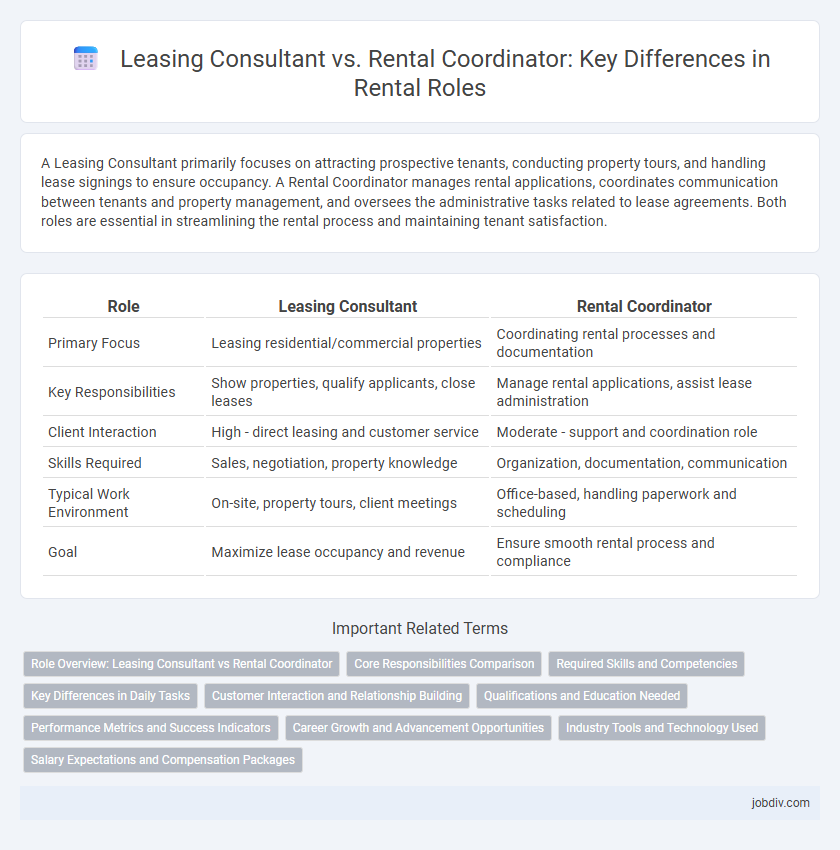A Leasing Consultant primarily focuses on attracting prospective tenants, conducting property tours, and handling lease signings to ensure occupancy. A Rental Coordinator manages rental applications, coordinates communication between tenants and property management, and oversees the administrative tasks related to lease agreements. Both roles are essential in streamlining the rental process and maintaining tenant satisfaction.
Table of Comparison
| Role | Leasing Consultant | Rental Coordinator |
|---|---|---|
| Primary Focus | Leasing residential/commercial properties | Coordinating rental processes and documentation |
| Key Responsibilities | Show properties, qualify applicants, close leases | Manage rental applications, assist lease administration |
| Client Interaction | High - direct leasing and customer service | Moderate - support and coordination role |
| Skills Required | Sales, negotiation, property knowledge | Organization, documentation, communication |
| Typical Work Environment | On-site, property tours, client meetings | Office-based, handling paperwork and scheduling |
| Goal | Maximize lease occupancy and revenue | Ensure smooth rental process and compliance |
Role Overview: Leasing Consultant vs Rental Coordinator
Leasing Consultants primarily focus on showcasing properties, conducting tours, and securing lease agreements with prospective tenants, ensuring a smooth tenant onboarding process. Rental Coordinators manage administrative tasks such as processing applications, coordinating maintenance requests, and communicating between property management and residents to maintain operational efficiency. Both roles are essential for rental property success, with Leasing Consultants driving tenant acquisition and Rental Coordinators supporting ongoing property management logistics.
Core Responsibilities Comparison
Leasing Consultants focus on securing tenants by showcasing properties, conducting tours, and handling lease applications, emphasizing direct customer interaction and sales. Rental Coordinators manage administrative tasks such as processing paperwork, coordinating maintenance requests, and ensuring compliance with leasing policies, prioritizing operational efficiency. Both roles collaborate closely to streamline tenant acquisition and retention, but Leasing Consultants drive leasing volume while Rental Coordinators ensure the quality of ongoing rental management.
Required Skills and Competencies
Leasing Consultants require strong sales and customer service skills, proficiency in property management software, and the ability to conduct property tours while addressing tenant inquiries. Rental Coordinators need excellent organizational and administrative skills, expertise in processing rental applications, lease documentation, and coordinating maintenance requests efficiently. Both roles demand effective communication, attention to detail, and knowledge of leasing regulations to ensure smooth rental operations.
Key Differences in Daily Tasks
Leasing Consultants focus on showing properties, processing applications, and securing tenant agreements, emphasizing direct tenant interaction and sales skills. Rental Coordinators handle lease documentation, rent collection, and coordinate maintenance requests, prioritizing administrative support and operational efficiency. The key difference lies in Leasing Consultants driving occupancy through client engagement, while Rental Coordinators manage backend leasing processes.
Customer Interaction and Relationship Building
Leasing Consultants excel in direct customer interaction by guiding prospects through property tours, lease applications, and addressing specific tenant needs to foster trust and satisfaction. Rental Coordinators primarily support this process by managing behind-the-scenes communications, scheduling, and documentation, ensuring a seamless experience that strengthens overall tenant relationships. Both roles collaborate closely to enhance client engagement and maintain positive long-term connections in the rental market.
Qualifications and Education Needed
Leasing Consultants typically require strong customer service skills, a high school diploma or equivalent, and knowledge of leasing laws, with many employers favoring candidates who have experience in sales or property management. Rental Coordinators often need more advanced organizational and administrative qualifications, including proficiency in property management software and potentially an associate degree or certification related to real estate or business administration. Both roles benefit from ongoing education in fair housing regulations and local rental market trends to ensure compliance and effective property management.
Performance Metrics and Success Indicators
Leasing Consultants are evaluated primarily on lease conversion rates, tenant retention, and lease renewal percentages, reflecting their direct impact on occupancy and revenue growth. Rental Coordinators focus on operational efficiency metrics such as processing time for applications, accuracy in lease documentation, and coordination effectiveness, ensuring smooth leasing transactions. Both roles demand strong communication skills, but Leasing Consultants drive sales performance while Rental Coordinators optimize administrative workflow, making their success indicators complementary yet distinct.
Career Growth and Advancement Opportunities
Leasing Consultants typically engage directly with prospective tenants, gaining valuable sales and customer service skills that can lead to roles such as Leasing Manager or Property Manager. Rental Coordinators often focus on administrative tasks and lease documentation, building organizational expertise that positions them well for advancement into roles like Rental Manager or Compliance Specialist. Choosing a path depends on whether one prefers client interaction or administrative proficiency, both offering distinct growth opportunities within property management.
Industry Tools and Technology Used
Leasing Consultants primarily use customer relationship management (CRM) software and property management systems like Yardi and AppFolio to track tenant inquiries and lease applications efficiently. Rental Coordinators rely on leasing and maintenance software such as Buildium and Entrata to coordinate rental agreements, schedule property showings, and manage communication between tenants and property managers. Both roles utilize digital marketing platforms and electronic signature tools to streamline leasing processes and enhance tenant engagement.
Salary Expectations and Compensation Packages
Leasing consultants typically earn an average salary of $40,000 to $50,000 annually, with commissions and bonuses based on leasing performance, while rental coordinators generally receive a base salary ranging from $35,000 to $45,000, often with fewer incentives. Compensation packages for leasing consultants may include commission structures that reward successful lease signings and renewals, whereas rental coordinators receive steady pay with possible benefits like health insurance and paid time off. Salary expectations vary by region, experience, and property size, influencing total compensation and job responsibilities in leasing and rental coordination roles.
Leasing Consultant vs Rental Coordinator Infographic

 jobdiv.com
jobdiv.com